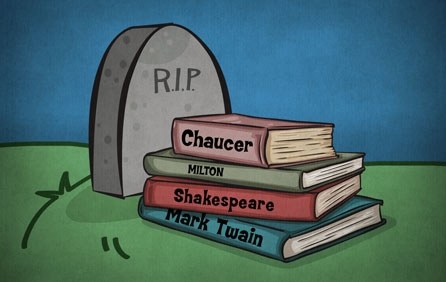By Robert McHenry Tuesday, January 21, 2014
Publishers and postmodernism are contributing to the death of the humanities.
If you’ve been looking in the right places in the past few years, you’ve encountered fairly regular laments for the death of the humanities, or the liberal arts, or any sort of non-vocational education. And there is much to lament. Recently, Heather Mac Donald, writing in the Wall Street Journal, reminded us that in 2011 the English Department at UCLA decided that their majors no longer need read any Chaucer or Shakespeare or Milton.
This is not to say that those writers are not taught; only that they can be sidestepped by the cagey student. The present catalog includes a course on The Canterbury Tales and another in which “The Wife of Bath’s Tale” is read (the latter a course focused on “dissent” in late medieval literature). And there are three courses that focus on Shakespeare: Early, Later, and “an introduction to Shakespeare race studies.” There is also one on Milton. But all of these can be sidestepped in favor of a course on plays not written by Shakespeare.
The prospective English major is directed to take one course from each of three “breadth” groups: Gender, Race, Ethnicity, Disability, and Sexuality Studies; Imperial, Transnational, and Postcolonial Studies; and Genre Studies, Interdisciplinary Studies, Critical Theory. (I wondered at first if I had fallen for a parody website, but no.) One of the “genre” courses is “The American Political Novel,” in the description of which the student is told that authors to be covered include Charles W. Chesnutt, Charlotte Perkins Gilman, Thomas Dixon, Alice Walker, and E.L. Doctorow. Yes, they manage to squeeze in the author of The Clansman. Among the names not seen here: Henry Adams, Edward Bellamy, John Dos Passos, Theodore Dreiser, James T. Farrell, Hamlin Garland, Robert Heinlein, Jack London, Norman Mailer, Frank Norris, Upton Sinclair, John Steinbeck, Gore Vidal, and Robert Penn Warren. Anything strike you about that list?
I think Mac Donald stretches for a point when she writes that UCLA’s “English department was one of the last champions of the historically informed study of great literature, uncorrupted by an ideological overlay. Precisely for that reason, it was the most popular English major in the country, enrolling a whopping 1,400 undergraduates.”
That may have been the reason, but when I was in college, English was more or less the default major for bright students who had no particular career in mind. (A few more venturesome types went in for Comparative Lit.) Mac Donald concludes her lament by asserting “There is no greater lesson from the past than the intractability of human folly.”
High on the top-ten folly chart for anyone who still thinks liberal education a good thing is the submersion of literature into a murk of “theory” and “studies.” And one direct consequence shows up in the book list for these courses.
Here are some books I still have on my shelf from college:
Beowulf (Mentor Books, 60¢)
The Aeneid (Vintage Books, 95¢; and who could have guessed that I would come to
treasure the cover art by Edward Gorey?)
Mont-Saint-Michel and Chartres (Mentor Classic, 75¢)
The Red Badge of Courage (Houghton Mifflin, $1.15)
Leaves of Grass (Viking Press, 95¢)
Animal Farm (Signet Classic, 60¢)
The Adventures of Huckleberry Finn (Houghton Mifflin, 90¢)
Moby Dick (Bobbs Merrill, $1.75; well, after all, it’s over 700 pages long)
(By the way, the name Mark Twain appears nowhere in the course descriptions from the UCLA English Department, and Melville’s occurs only for his poetry.)
You probably catch the drift. These books are all still readily available in trade paperback editions at what we have learned to think of as reasonable prices (i.e., only 10 to 15 times what I paid back then). But these will hardly do. What is needed now are monographs, casebooks, and anthologies offering bits and pieces from this and that writer, along with explanatory essays in exquisite and impenetrable postmodernese by a few name professors, and some critical notes cobbled together by a teaching assistant.
The which publishers are only too happy to supply, of course, at $30 or $40 per. It’s only fair, after all. Imagine you’re a publisher of college texts. You’ve been smarting for years over the grosses the fellows down in the elhi division of the company have been pulling in. Those are the guys who look at a manuscript and say “Hey, we need a large font, lots of pointless design elements, a ton of four-color art on heavy coated stock, and our — heh heh — patented school and library binding! Oh, and remind me to call the backpack people about our kickback.” They’ve been getting away with that for decades because school boards and adoption committees don’t spend their own money.
So instead of buying a cheap paperback copy of The Canterbury Tales and one of Hamlet and one of Paradise Lost and so on — and perhaps keeping them on his shelf for the next 50 years — today’s student of English literature comes away with a passel of dense hardbacks containing a little lit and a lotta bosh. And then he ditches them the minute the final exam is over.
The ancillary benefit, of course, is that the artfully dodging student who gets his “Wife of Bath’s Tale” this way will be spared the temptation ever to read any of the other tales. If he is an oldies fan he may wonder from time to time as life goes by about the miller who told his tale in “Whiter Shade of Pale,” but he’ll be safe from ever learning why Alisoun quod “Tehee” as she clapte the wyndow to.
Robert McHenry is former editor of Encyclopædia Britannica and is a contributing writer to American.com. He is the author of How to Know.
See online: Books vs. Literature

